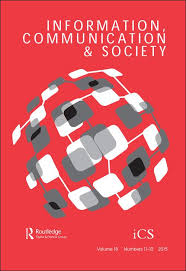The call for papers is now open for a two-day symposium held under the auspices of the journal ‘Information, Communication & Society’ (iCS) at the Centre on Social Movement Studies, 1-2 July 2019.

Cosmos (The Centre for Social Movement Studies), Scuola Normale Superiore, Florence, Italy, 1-2 July 2019
Deadline for abstracts: 15 March 2019
This two-day symposium held under the auspices of the journal ‘Information, Communication & Society’ (iCS) considers the shifting terrain of contemporary democratic politics. Over the course of this decade, a wave of popular discontent swept across much of the world, stoked by the financial crisis, the ensuing austerity and deep disenchantment with political institutions in both liberal democracies and autocracies. Social movements channelled and articulated aspirations for greater democratic accountability and participation, more equitable economic policies, greater concern for social welfare and climate change. Against a secular decline in party membership, voter turnout and institutional trust, movements have rekindled a participatory imaginary challenging the status quo of many democratic countries.
Criticized for a supposed inability to enact the political and social change they advocated, social movements were harbingers of a new political vehicle, the movement party. The rise and electoral success of party movements—from Podemos in Spain, to Cinque Stelle in Italy, Jobbik in Hungary, Momentum in the UK or La Republique en Marche in France—captured aspirations for progressive change as well as anger and anxieties about globalisation, migration and the socio-economic and cultural upheaval that such processes have wrought. Occupying the breadth of the ideological spectrum—from the far right to the radical left—these movements put forward a radical criticism of political or media institutions, advocating participatory as well as populist reformulations of notions of citizenship, civic practices and organisational structures. Against the odds, they have scaled up, endured and have the potential to become entrenched despite the initially limited resources available to them. Notwithstanding their ideological differences, digital media appear to have provided important opportunities for the emergence of techno-populist ‘connective’ movements and parties in media systems largely unfavourable to them, thereby posing renewed challenges to incumbents.
Considering the above, the symposium will grapple with such questions as: what does the rising prominence of social and/or party movements mean for democracy? What are the consequences of their rise for representative democracy? What explains their presence on both the left and the right of the political spectrum? How does their digital media use bear on their organisational structures and cultures or their relationship with the media?
The symposium invites scholars and other informed observers to present papers discussing how over the last decade, social movements, party movements and other collective actors emerging in the fractured contemporary media landscape have produced knowledge, learn and develop new or overhaul existing participatory cultures and techno-populist identities; congeal competitive political agendas that challenge established political positions; rekindle trust and even faith in political leadership and democratic governance; (re)shaped (un)conventional citizenship norms, practices and action repertoires, harnessing affordances of self-publication technologies, data analytics and news media values to maximize their visibility, appeal and reach while also at times critiquing the dominant commercial logics of media and social media companies.
Building on these considerations, we encourage submissions that address but are not limited to the following aims:
We invite 500-word abstracts outlining empirical, theoretical or policy-oriented papers that address these or cognate topics. The abstract should point to study conclusions. It should be accompanied by a 100-word biography of the presenter(s) together with contact details. Abstracts/biographies/contact details should be emailed to Dan Mercea (dan.mercea.1@city.ac.uk).
All papers presented at the symposium will receive comments from a discussant. Following the symposium, paper authors will be invited to submit their manuscripts for publication in a special issue of the journal Information, Communication & Society.
Journal Article - 2025
Journal Article - 2023
Journal Article - 2023
Journal Article - 2023
Journal Article - 2023
Monograph - 2023
Monograph - 2022
Monograph - 2022
Journal Article - 2021
Journal Article - 2021